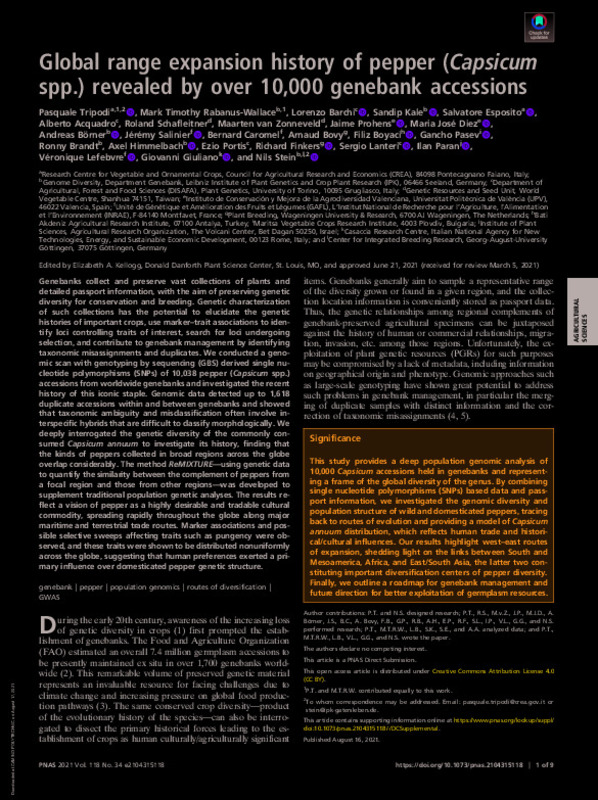Tripodi, P.; Rabanus-Wallace, MT.; Barchi, L.; Kale, S.; Esposito, S.; Acquadro, A.; Schafleitner, R.... (2021). Global range expansion history of pepper (Capsicum spp.) revealed by over 10,000 genebank accessions. Proceedings of the National Academy of Sciences. 118(34):1-9. https://doi.org/10.1073/pnas.2104315118
Por favor, use este identificador para citar o enlazar este ítem: http://hdl.handle.net/10251/199528
|
Título:
|
Global range expansion history of pepper (Capsicum spp.) revealed by over 10,000 genebank accessions
|
|
Autor:
|
Tripodi, Pasquale
Rabanus-Wallace, Mark Timothy
Barchi, Lorenzo
Kale, Sandip
Esposito, Salvatore
Acquadro, Alberto
Schafleitner, Roland
van Zooneveld, Maarten

 Prohens Tomás, Jaime
Prohens Tomás, Jaime

 Díez Niclós, Mª José Teresa De Jesús
Börner, Andreas
Salinier, Jérémy
Caromel, Bernard
Bovy, Arnaud
Boyaci, Filiz
Pasev, Gancho
Brandt, Ronny
Himmelbach, Axel
Portis, Ezio
Finkers, Richard
Lanteri, Sergio
Paran, Ilan
Lefebvre, Véronique
Giuliano, Giovanni
Stein, Nils
Díez Niclós, Mª José Teresa De Jesús
Börner, Andreas
Salinier, Jérémy
Caromel, Bernard
Bovy, Arnaud
Boyaci, Filiz
Pasev, Gancho
Brandt, Ronny
Himmelbach, Axel
Portis, Ezio
Finkers, Richard
Lanteri, Sergio
Paran, Ilan
Lefebvre, Véronique
Giuliano, Giovanni
Stein, Nils
|
|
Entidad UPV:
|
Universitat Politècnica de València. Escuela Técnica Superior de Ingeniería Agronómica y del Medio Natural - Escola Tècnica Superior d'Enginyeria Agronòmica i del Medi Natural
|
|
Fecha difusión:
|
|
|
Resumen:
|
[EN] Genebanks collect and preserve vast collections of plants and
detailed passport information, with the aim of preserving genetic
diversity for conservation and breeding. Genetic characterization
of such collections has ...[+]
[EN] Genebanks collect and preserve vast collections of plants and
detailed passport information, with the aim of preserving genetic
diversity for conservation and breeding. Genetic characterization
of such collections has the potential to elucidate the genetic
histories of important crops, use marker¿trait associations to identify loci controlling traits of interest, search for loci undergoing
selection, and contribute to genebank management by identifying
taxonomic misassignments and duplicates. We conducted a genomic scan with genotyping by sequencing (GBS) derived single nucleotide polymorphisms (SNPs) of 10,038 pepper (Capsicum spp.)
accessions from worldwide genebanks and investigated the recent
history of this iconic staple. Genomic data detected up to 1,618
duplicate accessions within and between genebanks and showed
that taxonomic ambiguity and misclassification often involve interspecific hybrids that are difficult to classify morphologically. We
deeply interrogated the genetic diversity of the commonly consumed Capsicum annuum to investigate its history, finding that
the kinds of peppers collected in broad regions across the globe
overlap considerably. The method ReMIXTURE¿using genetic data
to quantify the similarity between the complement of peppers from
a focal region and those from other regions¿was developed to
supplement traditional population genetic analyses. The results reflect a vision of pepper as a highly desirable and tradable cultural
commodity, spreading rapidly throughout the globe along major
maritime and terrestrial trade routes. Marker associations and possible selective sweeps affecting traits such as pungency were observed, and these traits were shown to be distributed nonuniformly
across the globe, suggesting that human preferences exerted a primary influence over domesticated pepper genetic structure.
[-]
|
|
Palabras clave:
|
Genebank
,
Pepper
,
Population genomics
,
Routes of diversification
,
GWAS
|
|
Derechos de uso:
|
Reconocimiento (by)
|
|
Fuente:
|
Proceedings of the National Academy of Sciences. (issn:
0027-8424
)
|
|
DOI:
|
10.1073/pnas.2104315118
|
|
Editorial:
|
Proceedings of the National Academy of Sciences
|
|
Versión del editor:
|
https://doi.org/10.1073/pnas.2104315118
|
|
Código del Proyecto:
|
info:eu-repo/grantAgreement/EC/H2020/677379/EU
|
|
Agradecimientos:
|
We are gratefully acknowledge Annette Marlow, Beate Kamm, Jacqueline Pohl, Susanne Konig, Ines Walde, Mary Ziems, and Anne Massire for technical assistance. We wish to acknowledge the G2P-SOL proj-ect, funded by the European ...[+]
We are gratefully acknowledge Annette Marlow, Beate Kamm, Jacqueline Pohl, Susanne Konig, Ines Walde, Mary Ziems, and Anne Massire for technical assistance. We wish to acknowledge the G2P-SOL proj-ect, funded by the European Union Horizon 2020 research and innovation program under Grant Agreement No. 677379.
[-]
|
|
Tipo:
|
Artículo
|









